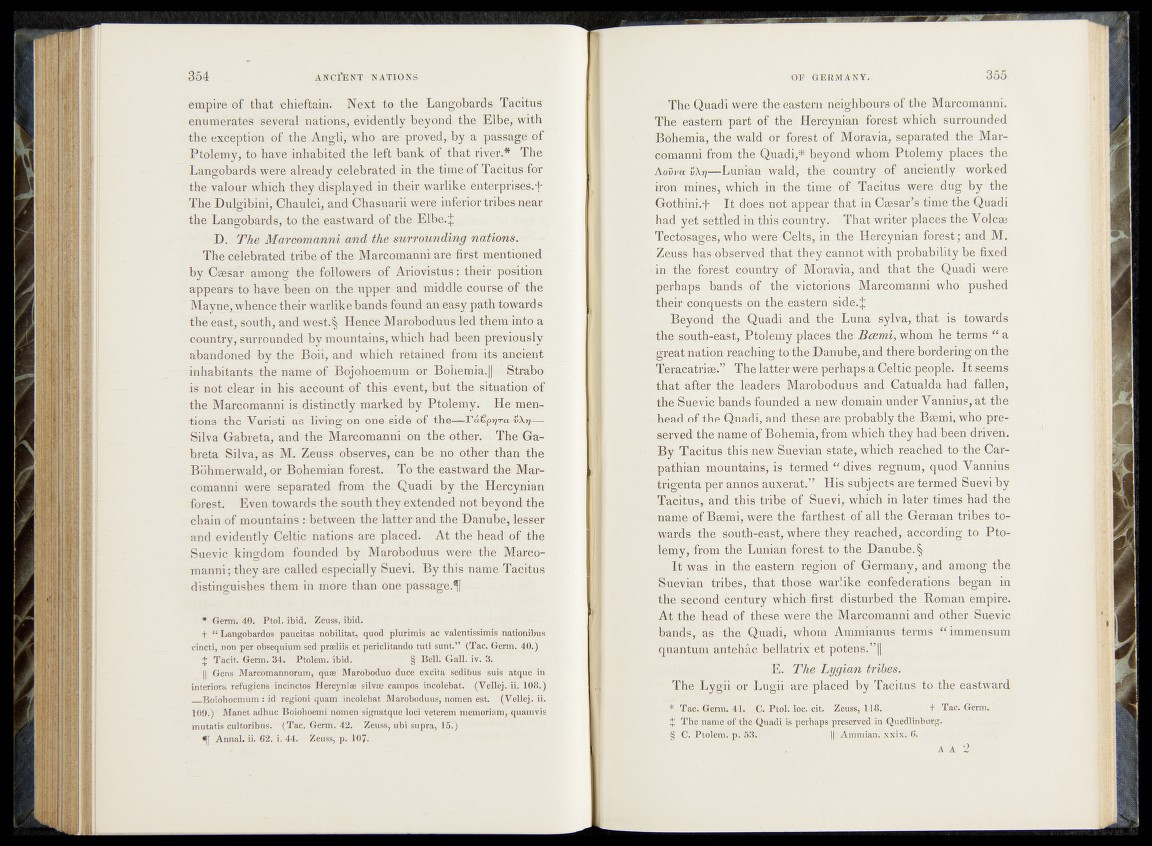
empire of that chieftain". Next to the Langobards Tacitus
enumerates several nations, evidently beyond the Elbe, with
the.exception of the Angli, who are proVed, by a passage of
Ptolemy, to have inhabited the left bank of that river.* The
Langobards were already celebrated in the time of Tacitus for
the valour which they displayed in their warlike enterprises.t
The Dulgibini, Chaulci, and Chasuarii were inferior tribes near
the Langobards, to the eastward of the Elbe,£
D. The Marcomanni and the surrounding nations.
The celebrated tribe of the Marcomanni are first mentioned
by Caesar among the followers of Ariovistus; their position
appears to have been on the tipper and middle* ceiirsemf the
Mayne, whence their warlike bands found an easy path towards
the east, south, and wéÈH§ Henöe Maroboduusled them into a
country, surrounded by mountains, which had been previously
abandoned by the Boii, and which obtained from its^anoient
inhabitants the name of Bojohoemum or Bohemia^foStrabo
is not clear in his account of this event, but thepsituatiom 6f
the Marcomannids distinctly marked*by Ptolemy;m Her mentions
the Varisti asdivmg on one side of ther^Ta^pjjra v\r]—
Silva Gabreta, and the Marcomanni on the other. The Ga-
breta Silva, as M. Zeuss observes, can be no- other than thd-
Böhmerwald, or Bohemian forest. To the eastward the-Mar-
eomanni were separated from ttierQnadi by the Hercynian
forest. Even towards the south they extended not beyond the
chain of mountains: between the latter and the Danube,' lesser
and evidently Celtic nations are placed. At the heSd&IJft' tbji
Suevic kingdom founded by Maroboduus were the Marco-
manrri; they are called especially Suevi. By this name Tacitus
distinguishes them in more than one passage.^
* Germ» 40. Ptol. ibid. Zeuss, ibid;
+ “ Langobardos paucitas nobilitat, quod plurimjs ac valentissimis nationibus
cincti, non per obsequium sed praeliis et periclitando tnti sunt.” (Tac. Germ. 40.)
f Tacit. Germ. 34. Ptolem. ibid. . ' § Bell. Gall. iv. 8.
jj Gens- Marcomannorum, qu® Marobodüo duce excita sedibus suis atque in
interiora reftigiens incinctos Hercyni® silvae campos incolebat. -(Vellej. ii. 108.)
__Boiohoemnm: id regioni quain incolebat Maroboduus, nomen est. (Vellej. ii.
l09.) Manet adhuc Boiohoemi nomen sjgnatque loci veterem memoriam, quamvis
mutatis cultoribus. (Tac. Germ. 42. - Zeuss, ubi supra, 1§.)
Annal. in 62. i, 44. - Zeuss, p. 107.
The Quadi were the eastern neighbours of the Marcomanni.
The eastern part of the Hercynian forest which surrounded
Böhemia, the wald or, forest of Moravia, separated the Mar-
iêómanni from the Quadi,* bey©nd\whom Ptolemy places the
'Aovva. ÜA.7J—Lubian wald, the Country .of anciently worked
'iron minés, which in Vhe -timê fof Tacilus were dug by the
Gothini.f ’ It doesphötia'ppMl that in Caesar’s time the Quadi
had yet settled in this try. That writer places the Vole®
Tecfokagé&fwho wefe^Celts, in the Hercynian forest; and M.
jZeuSS') hascbséii^ed that theyfeannofewith, probability be fixed
an -th e forest. country o f Moravia,-and that the*. Quadi were
^perhaps bands of the vjqtorimjs ' Marcomanni who pushed
their conquests, on the eastern sid e^ . ?
o: Beyond the Quadi and the;lLuna sylva, that is towards
the south-east, Ptolemy places the Bcemi, whom he terms “ a
jgr.eat nation/eaching tothe,Danub^and there bprdering on the
Teracatriaevv, The lJfterwere pbi|iaps;a?*Seltic people." Itseèmg;
that after the leaders Maroboduus and Catualda had fallen,
thej Suévièbands'fQunded arnèw domain under Vannius,at thé
head of the Quadi, andti^^exare,probably thèéBmmi, who preserved
the name-of Bohemiay fropa^liieh they had been driven.
•By Tacitus this nes^ Suevian state, which ■ rdache#d to the Carpathian
mountains*"is "formed “ dives reghum, quod Vannius
trigenta per annos duxerat.” His|i§ubjeéfoare termecL^ueyi by
Tacitus, and ,thm,irrbe of Suevi, which in lafor.tifPe^had the
name of Bsemi, were the farthest of all thé-German tribes{lfep-
wards the south-east,, wfflfeitheyVreached, according to Ptolemy,
from the Lunian forest fpjthe Danube*!^
It was in the eastern regjoif 'of Germany, and among the
Suevian tribes, that those warlike confederations began in
the second century which first disturbed the Roman empire.
At the head of these J^foHhe Marcomanni and other Suevic
bands, as the Quadi, whom Ammianus terms “ immensum
quantum anteh&C bellatrjx et pot'ens/’^
,, E. The Lygiari tribesv
The Lygii or Lugii are placed by Tacitus to the eastward
Tac. Germ. 41« ‘,G. Ptol. lqc.‘CiU . Zeuss, + Tac. Germ.
' $ The name'of the Quadi is perhaps preserved feQuedlinbuTg.
C. Ptolem.1 p. 53. jpAmmian. xxix; 6.
A A 2